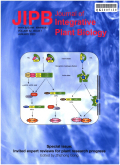- 钛学术文献服务平台 \
- 学术期刊 \
- 基础科学期刊 \
- 生物科学期刊 \
- 植物学报(英文版)期刊 \
The power and versatility of genome editing tools in crop improvement
The power and versatility of genome editing tools in crop improvement
基本信息来源于合作网站,原文需代理用户跳转至来源网站获取
摘要:
Increasing world population, global climate change, de-creased farmland, environmental pollution and ecological deterioration represent unprecedent challenges for crop production to ensure global food security (Hickey et al., 2019;Li et al., 2021a). It is estimated that by the year 2050, 50%more food is needed to feed the increasing population (Bailey-Serres et al., 2019). Thus, it is urgent to boost crop production by using cutting-edge technologies. Genome editing technologies have revolutionized the plant research field and offer great potential in crop improvement (Ma et al., 2015; Li et al., 2021b; Zhan et al., 2021). Of the several ge-nome editing technologies, clustered regularly interspaced palindromic repeats (CRISPR) and its associated Cas protein (CRISPR/Cas), has become the dominant one in the past several years because it is simple, efficient and cost-effective.

推荐文章
基于CPN Tools的抑制弧改进方法研究
Petri
有色Petri网工具
抑制弧
列表
令牌
基于Arc Hydro Tools对辽河流域的自动提取
DEM
河网提取
Arc Hydro Tools
Pro Tools光纤网络系统设计分析
光纤网络
Pro Tools
AVID unity
逻辑参数库中Power参数的提取
逻辑参数
Power提取
激励波形
内容分析
关键词云
关键词热度
相关文献总数
(/次)
(/年)
引文网络
引文网络
二级参考文献 (228)
共引文献 (248)
参考文献 (18)
节点文献
引证文献 (0)
同被引文献 (0)
二级引证文献 (0)
1978(1)
- 参考文献(0)
- 二级参考文献(1)
1983(1)
- 参考文献(0)
- 二级参考文献(1)
1984(1)
- 参考文献(0)
- 二级参考文献(1)
1987(1)
- 参考文献(0)
- 二级参考文献(1)
1990(2)
- 参考文献(0)
- 二级参考文献(2)
1995(1)
- 参考文献(0)
- 二级参考文献(1)
1998(2)
- 参考文献(0)
- 二级参考文献(2)
2000(1)
- 参考文献(0)
- 二级参考文献(1)
2001(2)
- 参考文献(0)
- 二级参考文献(2)
2002(3)
- 参考文献(0)
- 二级参考文献(3)
2003(2)
- 参考文献(0)
- 二级参考文献(2)
2004(1)
- 参考文献(0)
- 二级参考文献(1)
2005(1)
- 参考文献(0)
- 二级参考文献(1)
2006(2)
- 参考文献(0)
- 二级参考文献(2)
2007(1)
- 参考文献(0)
- 二级参考文献(1)
2008(1)
- 参考文献(0)
- 二级参考文献(1)
2009(5)
- 参考文献(0)
- 二级参考文献(5)
2010(2)
- 参考文献(0)
- 二级参考文献(2)
2011(2)
- 参考文献(0)
- 二级参考文献(2)
2012(5)
- 参考文献(0)
- 二级参考文献(5)
2013(31)
- 参考文献(0)
- 二级参考文献(31)
2014(15)
- 参考文献(0)
- 二级参考文献(15)
2015(22)
- 参考文献(1)
- 二级参考文献(21)
2016(27)
- 参考文献(2)
- 二级参考文献(25)
2017(41)
- 参考文献(2)
- 二级参考文献(39)
2018(31)
- 参考文献(3)
- 二级参考文献(28)
2019(28)
- 参考文献(3)
- 二级参考文献(25)
2020(8)
- 参考文献(4)
- 二级参考文献(4)
2021(6)
- 参考文献(3)
- 二级参考文献(3)
2021(6)
- 参考文献(3)
- 二级参考文献(3)
- 引证文献(0)
- 二级引证文献(0)
引文网络交叉学科
相关学者/机构
期刊影响力
植物学报(英文版)
主办单位:
中国植物学会
出版周期:
月刊
ISSN:
1672-9072
CN:
11-5067/Q
开本:
大16开
出版地:
北京香山南辛村20号中科院植物所内
邮发代号:
2-500
创刊时间:
1952
语种:
eng
出版文献量(篇)
3621
总下载数(次)
1
总被引数(次)
74646
期刊文献
相关文献
推荐文献
- 期刊分类
- 期刊(年)
- 期刊(期)
- 期刊推荐
力学
化学
地球物理学
地质学
基础科学综合
大学学报
天文学
天文学、地球科学
数学
气象学
海洋学
物理学
生物学
生物科学
自然地理学和测绘学
自然科学总论
自然科学理论与方法
资源科学
非线性科学与系统科学
植物学报(英文版)2022
植物学报(英文版)2021
植物学报(英文版)2020
植物学报(英文版)2019
植物学报(英文版)2018
植物学报(英文版)2017
植物学报(英文版)2016
植物学报(英文版)2015
植物学报(英文版)2014
植物学报(英文版)2013
植物学报(英文版)2012
植物学报(英文版)2011
植物学报(英文版)2010
植物学报(英文版)2009
植物学报(英文版)2008
植物学报(英文版)2007
植物学报(英文版)2006
植物学报(英文版)2005
植物学报(英文版)2004
植物学报(英文版)2003
植物学报(英文版)2002
植物学报(英文版)2001
植物学报(英文版)2000
植物学报(英文版)1999
植物学报(英文版)1998
植物学报(英文版)2021年第9期
植物学报(英文版)2021年第8期
植物学报(英文版)2021年第7期
植物学报(英文版)2021年第6期
植物学报(英文版)2021年第5期
植物学报(英文版)2021年第4期
植物学报(英文版)2021年第3期
植物学报(英文版)2021年第2期
植物学报(英文版)2021年第11期
植物学报(英文版)2021年第10期
植物学报(英文版)2021年第1期

 免费查重
免费查重










